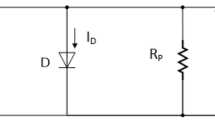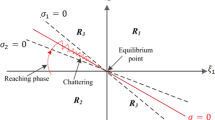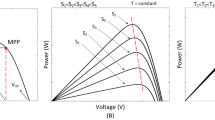Abstract
The adaptive interval type-2 (IT2) fuzzy output feedback control problem is studied for a single-phase photovoltaic grid-connected power system. The equivalent resistors of the inductors in the system are unknown and the part states are not available. Interval type-2 fuzzy logic systems (IT2FLSs) are utilized to approximate the uncertain nonlinear dynamics, and an IT2 fuzzy state observer is designed to estimate the unavailable states. By introducing a command filter method and using a backstepping control design technique, an IT2 fuzzy output feedback control scheme is investigated, in which the constraint conditions of pulse width modulation are ensured via mean-value theorem. It is proved that all the variables of the closed-loop photovoltaic system are uniformly ultimately bounded. The simulation and comparison results demonstrate the validity of the proposed control scheme.
Similar content being viewed by others
References
F. Dincer, “The analysis on photovoltaic electricity generation status, potential and policies of the leading countries in solar energy,” Renewable and Sustainable Energy Reviews, vol. 15, no. 1, pp. 713–720, January 2011.
M. B. Satti and A. Hasan, “Direct model predictive control of novel H-bridge multilevel inverter based grid-connected photovoltaic system,” IEEE Access, pp. 62750–62758, May 2019.
S. Foti, S. de Caro, G. Scelba, T. Scimone, A. Testa, M. Cacciato, and G. Scarcella, “An optimal current control strategy for asymmetrical hybrid multilevel inverters,” IEEE Transactions on Industry Applications, vol. 54, no. 5, pp. 4425–4436, September-October 2018.
H. Komurcugil, “Steady-state analysis and passivity-based control of single-phase PWM current-source inverters,” IEEE Transactions on Industrial Electronics, vol. 57, no. 3, pp. 1026–1030, March 2010.
X. Quan, Z. Wu, X. Dou, M. Hu, and A. Q. Huang, “Load current decoupling based LQ control for three-phase inverter,” IEEE Transactions on Power Electronics, vol. 33, no. 6, pp. 5476–5491, June 2018.
L. Zheng, F. Jiang, J. Song, Y. Gao, and M. Tian, “A discrete-time repetitive sliding mode control for voltage source inverters,” IEEE Journal of Emerging and Selected Topics in Power Electronics, vol. 6, no. 3, pp. 1553–1566, September 2018.
H. Li, J. Wang, H. Du, and H. R. Karimi, “Adaptive sliding mode control for Takagi-Sugeno fuzzy systems and its applications,” IEEE Transactions on Fuzzy Systems, vol. 26, no. 2, pp. 531–542, April 2018.
Y. Pan, P. Du, H. Xue and H. Lam, “Singularity-free fixed-time fuzzy control for robotic systems with user-defined performance,” IEEE Transactions on Fuzzy Systems, June 2020. DOI: https://doi.org/10.1109/TFUZZ.2020.2999746
H. Li, Y. Wang, D. Yao, and R. Lu, “A sliding mode approach to stabilization of nonlinear Markovian jump singularly perturbed systems,” Automatica, vol. 97, pp. 404–413, November 2018.
H. Liang, G. Liu, H. Zhang, and T. Huang, “Neural-network-based event-triggered adaptive control of non-affine nonlinear multiagent systems with dynamic uncertainties,” IEEE Transactions on Neural Networks and Learning Systems, vol. 32, no. 5, pp. 2239–2250, 2021.
H. Ma, H. Li, R. Lu, and T. Huang, “Adaptive event-triggered control for a class of nonlinear systems with periodic disturbances,” Science China. Information Sciences, vol. 63, no. 5, Article number 150212, 2020.
W. Bai, T. Li, and S. Tong, “NN reinforcement learning adaptive control for a class of nonstrict-feedback discretetime systems,” IEEE Transactions on Cybernetics, vol. 50, no. 11, pp. 4573–4584, November 2020.
H. Liang, G. Liu, T. Huang, H. K. Lam, and B. Wang, “Cooperative fault-tolerant control for networks of stochastic nonlinear systems with non-differential saturation nonlinearity,” IEEE Transactions on Systems, Man, and Cybernetics: Systems, September 2020. DOI: https://doi.org/10.1109/TSMC.2020.3020188
M. A. Hannan, Z. A. Ghani, M. M. Hoque, P. J. Ker, A. Hussain, and A. Mohamed, “Fuzzy logic inverter controller in photovoltaic applications: issues and recommendations,” IEEE Access, vol. 7, no. 3, pp. 24934–24955, February 2019.
F. Lin, K. Lu, T. Ke, B. Yang, and Y. Chang, “Reactive power control of three-phase grid-connected PV system during grid faults using Takagi-Sugeno-Kang probabilistic fuzzy neural network control,” IEEE Transactions on Industrial Electronics, vol. 62, no. 9, pp. 5516–5528, September 2015.
M. A. Hannan, Z. A. Ghani, A. Mohamed, and M. N. Uddin, “Real-time testing of a fuzzy-logic-controller-based grid-connected photovoltaic inverter system,” IEEE Transactions on Industry Applications, vol. 51, no. 6, pp. 4775–4784, November-December 2015.
J. M. Mendel, R. I. John, and F. Liu, “Interval type-2 fuzzy logic systems made simple,” IEEE Transactions on Fuzzy Systems, vol. 14, no. 6, pp. 808–821, December 2006.
W. Peng, C. Li, G. Zhang, and J. Yi, “Interval type-2 fuzzy logic based transmission power allocation strategy for lifetime maximization of WSNs,” Engineering Applications of Artificial Intelligence, vol. 87, pp. 103269, January 2020.
X. Tao, Y. Yi, Z. Pu, and T. Xiong, “Robust adaptive tracking control for hypersonic vehicle based on interval type-2 fuzzy logic system and small-gain approach,” IEEE Transactions on Cybernetics, vol. 51, no. 5, pp. 2504–2517, 2021.
N. N. Venkataramana, S. P. Singh, A. Panda, and A. K. Panda, “A novel interval type-2 fuzzy based direct torque control of induction motor drive using five-level diode-clamped inverter,” IEEE Transactions on Industrial Electronics, vol. 68, no. 1, pp. 149–159, January 2021.
S. Tong, X. Min, and Y. Li, “Observer-based adaptive fuzzy tracking control for strict-feedback nonlinear systems with unknown control gain functions,” IEEE Transactions on Cybernetics, vol. 50, no. 9, pp. 3903–3913, September 2020.
S. Tong, K. Sun, and S. Sui, “Observer-based adaptive fuzzy decentralized optimal control design for strict-feedback nonlinear large-scale systems,” IEEE Transactions on Fuzzy Systems, vol. 26, no. 2, pp. 569–584, April 2018.
X. Xie, M. Jiang, “Dynamic state feedback stabilization of stochastic cascade nonlinear time-delay systems with SISS inverse dynamics,” IEEE Transactions on Automatic Control, vol. 64, no. 12, pp. 5132–5139, December 2019.
W. Xiao, L. Cao, H. Li, and R. Lu, “Observer-based adaptive consensus control for nonlinear multi-agent systems with time-delay,” Science China. Information Sciences, vol. 63, no. 3, pp. 132202, February 2020.
Z. Zhao, J. Yang, S. Li, X. Yu, and Z. Wang, “Continuous output feedback TSM control for uncertain systems with a DC-AC inverter example,” IEEE Transactions on Circuits and Systems II: Express Briefs, vol. 65, no. 1, pp. 71–75, January 2018.
Y. Zhu and J. Fei, “Disturbance observer based fuzzy sliding mode control of PV grid connected inverter,” IEEE Access, vol. 6, pp. 21202–21211, April 2018.
Q. Liang and J. M. Mendel, “Equalization of nonlinear time-varying channels using type-2 fuzzy adaptive filters,” IEEE Transactions on Fuzzy Systems, vol. 8, no. 5, pp. 551–563, October 2000.
W. Dong, J. A. Farrell, M. M. Polycarpou, V. Djapic, and M. Sharma, “Command filtered adaptive backstepping,” IEEE Transactions on Control Systems Technology, vol. 20, no. 3, pp. 566–580, May 2012.
Y. Li and S. Tong, “Command-filtered-based fuzzy adaptive control design for MIMO-switched nonstrict-feedback nonlinear systems,” IEEE Transactions on Fuzzy Systems, vol. 25, no. 3, pp. 668–681, June 2017.
Q. Zhou, G. Chen, R. Lu, and W. Bai, “Disturbance-observer-based event-triggered control for multi-agent systems with input saturation,” Scientia Sinica Informationis, vol. 49, no. 11, pp. 1502–1516, November 2019.
Y. Liu and H. Li, “Adaptive asymptotic tracking using barrier functions,” Automatica, vol. 98, pp. 239–246, December 2018.
Author information
Authors and Affiliations
Corresponding author
Additional information
Publisher’s Note Springer Nature remains neutral with regard to jurisdictional claims in published maps and institutional affiliations.
This work is supported by Shandong Key Laboratory of Intelligent Buildings Technology under Grant No. 2019019 and National Natural Science Foundation of China under Grant No. 61822307.
Tiechao Wang received his B.E. degree and M.E. degree in control theory and engineering from Liaoning Institute of Technology, Liaoning, China, in 1996 and in 2005, respectively, and a Ph.D. degree in control theory and engineering from Institute of Automation, Chinese Academy of Sciences, Beijing, China, in 2012. Currently, he is a Professor of the College of Electrical Engineering, Liaoning Institute of Technology, Liaoning, PR China. His research interests include fuzzy control, and neural network control for nonlinear systems.
Xuhang Zhang received his B.S. degree in electrical engineering and automation from Tangshan College, Tangshan, China in 2018, and is pursuing an M.S. degree in power system and automation from Liaoning University of Technology, Jinzhou, China. His research interests include power systems and adaptive control.
Yongming Li received his B.S. and M.S. degrees in applied mathematics from Liaoning University of Technology, Jinzhou, China, in 2004 and 2007, respectively. He received a Ph.D. degree in transportation information engineering & control from Dalian Maritime University, Dalian, China, in 2014. He is currently a Professor with the College of Science, Liaoning University of Technology. His current research interests include adaptive control, fuzzy control, and neural network control for nonlinear systems.
Rights and permissions
About this article
Cite this article
Wang, T., Zhang, X. & Li, Y. Type-2 Fuzzy Adaptive Output Feedback Saturation Control for Photovoltaic Grid-connected Power Systems. Int. J. Control Autom. Syst. 19, 2759–2768 (2021). https://doi.org/10.1007/s12555-020-0629-9
Received:
Revised:
Accepted:
Published:
Issue Date:
DOI: https://doi.org/10.1007/s12555-020-0629-9




